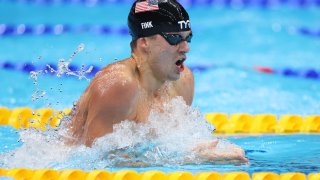
Nic Fink's full-time job is pretty straightforward: He's an Atlanta-based engineer at a utilities company.
His side hustle is a little more unexpected. During his off-hours, Fink trains as an Olympic athlete.
The 30-year-old American swimmer competed in the 2020 Summer Olympics in Tokyo, finishing fifth in the 200-meter breaststroke. He won the men's 100-meter breaststroke at the U.S. Championships last week, and in a post-heat interview, said he was competing while "on call" at his engineering job.
"My co-workers, in and out of the pool, are really great with my schedule. Flexibility in schedules for meetings and practice times have allowed me to be involved in both," Fink tells CNBC Make It.
Get a weekly recap of the latest San Francisco Bay Area housing news. Sign up for NBC Bay Area’s Housing Deconstructed newsletter.
Fink is an assistant project manager at Quanta Utility Engineering Services, where he's worked since March. His co-workers find his double-life quite interesting, he says.
"At best, they are super supportive of my career in the pool," says Fink. "And at worst, they are envious of my hours, especially when I have to leave early for afternoon workouts — but not envious of the reason for my hours."
Fink gets help from his wife, Melanie Margalis, who is also a Team USA swimmer. The duo spends Sundays meal-prepping for the week to have food ready for "the pool or office," he says.
Money Report
His side hustle makes money, too. In December, Fink earned $47,500 for his performance at the Short Course World Championships, according to news outlet Swim Swam. He's sponsored by TYR, a sportswear company that also partners with Olympians like Katie Ledecky and Michael Andrew.
Fink isn't the first professional athlete with a standard day job. French Olympic windsurfer Pierre le Coq is a dentist, Canadian Olympic runner Lanni Marchant is a criminal defense attorney and Australian Olympic clay target shooter Paul Adams is a registered nurse.
But balancing a side gig and a full-time job isn't easy, especially when the side gig is high-level athletic competition. Marchant does it because she knows her sports career will eventually end, and she wants to have a safety net, she told the Olympics' Athlete 365 blog.
"There's a time limit on being able to run at this level, and I'm well aware of that," Marchant said. "I really want to keep practicing law because that's what I'm educated in, and I'll need something to keep me busy for when I retire."
Fink's rationale is similar. He got a Master's degree in electrical and computer engineering because his "career in the pool is beginning to wind down" and he's "eager to accept a new challenge," his LinkedIn profile explains.
Of course, Fink's swimming career isn't over yet. Perhaps unexpectedly, maintaining a full-time job while competing on the side brings balance to his life, he says.
"I think it's important to keep your mind out of the pool when you are away from the pool," says Fink. "I think for some, that makes for a great balance and only improves in-water performance."
That means, for now, he'll continue to maintain his engineer-Olympian double-life. He's grateful that his workplace affords him the flexibility to do so, he adds.
"They're really flexible, and I'm just kind of able to get everything in and still able to do what I can do in the pool. I'm really thankful that they're letting me do it," he said in a statement following his victory last week.
DON'T MISS: Want to be smarter and more successful with your money, work & life? Sign up for our new newsletter!
Get CNBC's free Warren Buffett Guide to Investing, which distills the billionaire's No. 1 best piece of advice for regular investors, do's and don'ts, and three key investing principles into a clear and simple guidebook.






